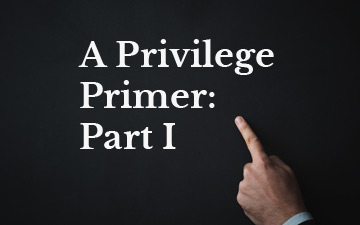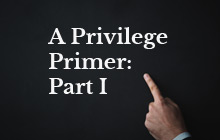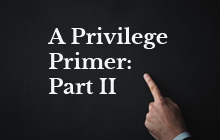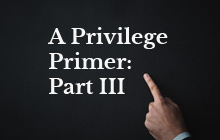A Privilege Primer, Part I: Gaudreau reminds that there is no accountant-client privilege in Canada. But why?

Can the courts compel Canadian accountants to disclose their tax analysis? In the first of a three-part series, Brian Studniberg of Henein Hutchison Robitaille LLP looks at the Gaudreau case currently before the Federal Court of Appeal in Quebec
 |
Brian Studniberg is a partner at Henein Hutchison Robitaille LLP where his practice focuses on tax disputes in both civil and criminal matters including with the Canada Revenue Agency and before the courts. |
THE question of whether or not tax advice provided by professional accountants in Canada can be protected by a form of legal privilege against compelled disclosure is more complicated than it might initially seem. In particular, there are circumstances when an accountant’s work product on tax matters can be protected, such as when the documentation is made in the process of furthering the client obtaining legal advice from a lawyer. But what about when a client obtains tax advice directly from a professional accountant?
As this series of commentary will make clear, the issue of whether what has been traditionally called “solicitor-client privilege” (but is probably better described as “legal advice privilege”) can be expanded to encompass documents created in the course of an accountant’s direct dealings with a client for tax advice has had a difficult and rather unsatisfactory history in the courts. Notwithstanding the regulatory changes to both the legal and accounting professions in Canada since the dawn of the 21st century, the prevailing judicial view on this topic has remained very much stuck in the past. A new case, now on appeal to the Federal Court of Appeal, might yet prompt some fresh thinking on the subject.
The Crown Seeks Production of an Accounting Firm’s Analysis: Gaudreau c. Le Roi
Whether the Canada Revenue Agency can compel a taxpayer to produce analysis it has received from accountants has been the subject of recent judicial attention in Canada in a few different contexts, including in BP Canada Energy Company v. Canada (National Revenue), 2017 FCA 61 (in relation to tax accrual working papers) and Minister of National Revenue v. Atlas Tube Canada ULC, 2018 FC 1086 (in relation to due diligence review in connection with a transaction).
In Gaudreau c. Le Roi, 2023 CCI 115 (at the time of writing only available in French and currently on appeal to the Federal Court of Appeal, court file no. A-214-23), the individual taxpayer was assessed under subsection 84(2) of the Income Tax Act, RSC 1985, c. 1 (5th Supp.), in relation to his sale of his equity interest in an insurance company. The sale took the form of a hybrid asset and share sale and was so structured to enable the taxpayer and other individual sellers to realize capital gains on the transaction, thereby setting up a claim for the capital gains exemption. Proceeding in that way enabled the taxpayer to shelter a portion of the sale from tax.
The CRA took the position that s. 84(2) applied so as to deem the proceeds of the transaction to be dividends rather than capital gains. At the taxpayer’s examination for discovery, the Crown sought disclosure of any tax planning documents including memoranda addressing the possibility of a hybrid sale transaction. Responding to the undertaking given at the examination, the taxpayer disclosed the existence of a memorandum prepared by an accounting firm for the buyer in the transaction and shared with the taxpayer as seller. The memo addressed tax considerations arising in respect of the transaction but not the potential application of s. 84(2).
The taxpayer refused to produce the memo itself, asserting that it did not provide any new information but could disclose « opinions subjectives » that the taxpayer was under no legal obligation to disclose on discovery. The Crown brought a motion to the Tax Court of Canada under section 92 of the General Procedure Rules to compel the taxpayer’s production of the memo.
In its reasons ordering the taxpayer to produce the accounting firm’s memo to the Crown in the tax litigation, the Tax Court noted at the outset that both of the parties agreed that the planning memo was not covered by “solicitor-client privilege” (« le privilège avocat-client »).
Resisting the Crown’s motion, the taxpayer asserted that the accounting firm’s six-page memo contained more than five pages describing the underlying transactions (which were also described in the CRA’s audit report, in the taxpayer’s notice of appeal to the Tax Court, and the Crown’s reply). The remainder of the memo is said to provide the accounting firm’s views on the application of the ITA to the transactions. That is, the memo includes “legal statements” (« énoncés juridiques ») or conclusions as to how the law applied to the circumstances although not in relation to s. 84(2).
The Crown argued that the memo was required to be produced. As a document, the memo met the broad test for relevance in tax litigation. The taxpayer replied that the memo was not relevant to an assessment predicated on s. 84(2) of the ITA and that therefore its production would be tantamount to furnishing support for the CRA’s fishing expedition; for the taxpayer, the Crown’s desire to obtain the accounting firm’s memo meant that the Crown was seeking to establish a new basis to backstop the CRA’s assessment other than s. 84(2). The taxpayer also argued that accountants as a general matter need to be able to provide taxpayers with their views as to how the tax law applies without running the risk that the accountants’ communications with their clients would face production.
Taking up these arguments, Justice St-Hilaire for the Tax Court first recited the key principles from the tax jurisprudence: Relevance in a discovery context is to be construed in broad fashion; the determination is to be made on a case-by-case basis; and the requesting party is entitled to seek any information or documentation which potentially could lead to a course of inquiry the answers to which would be directly or indirectly advance its case or damaging to that of the other party.
In addition, the Tax Court observed from prior authority that « une partie est en droit de connaître la thèse de la partie adverse au sujet d’une question de droit, mais pas d’avoir accès aux recherches juridiques ou au raisonnement ayant permis d’arriver à cette thèse » (“A party is entitled to know the position of the other party as to an issue of law, but is not entitled to have access to either the legal research or the reasoning by which that position is arrived at”). Moreover still, Justice St-Hilaire agreed with the Crown that the fact that a document might only contain information already possessed by the other party to a tax dispute was not a basis to refuse its production in the litigation.
Returning to the taxpayer’s argument that the Crown could potentially use the contents of the accounting firm’s memo in order to support a new basis for the CRA’s assessment, the Tax Court considered the taxpayer’s concern that the Crown might seek to amend its reply to the notice of appeal following the memo’s disclosure. To this, the Tax Court judge observed that amendments to pleadings after their closure would, if resisted by the taxpayer, require court approval under section 54 of the General Procedure Rules. That, in turn, would require the Tax Court to take stock of the taxpayer’s concern about potential prejudice on the actual facts of the case and in their context. In other words, this particular concern was speculative at present.
The Tax Court Orders Production of the Accounting Firm’s Memo in Gaudreau
In its reasons granting the Crown’s request for production of the accounting firm's memo, the Tax Court fixed its analysis largely with reference to how ITA s. 84(2) had been interpreted, noting for instance that the provision’s application entailed a consideration of the circumstances surrounding the transactions at issue.
The Tax Court’s reasoning in the case is seemingly understandable given the way the dispute appears to have been framed for the Court. Nevertheless, the decision is unsatisfying on account of the greater issues at stake. In particular, Gaudreau represents something of a missed opportunity for the courts to revisit the longstanding — and, it should be acknowledged, sometimes fiendishly difficult — need to draw a principled distinction between receiving tax advice from accountants and from lawyers.
In its decision, the Tax Court turned briefly to the taxpayer’s argument that accountants must be able to inform their clients of tax risks attending to their situations without doing so raising its own risk of disclosure of that communication. The taxpayer added that if such advice from accountants becomes commonly divulged, the compelled nature of the disclosure will lead to a chilling effect which would be detrimental to the accountant-client relationship. That weakening of the professional relationship with accountants itself accordingly runs the risk of reducing overall tax compliance.
The Tax Court judge made short work of the contention. Citing to Tower v. Minister of National Revenue, 2003 FCA 307, as an example of the authority, Tax Court emphasized the proposition that there is no accountant-client privilege with respect to the tax advice. The Tax Court noted, however, that the taxpayer in the case at bar did not press the potential for a case-by-case privilege (following the “Wigmore” criteria) but instead invoked a class privilege. In the circumstances, the Tax Court judge declined to address such potential protection against disclosure. The Tax Court allowed the Crown’s request for production and ordered the disclosure of the accounting firm’s memo.
To appreciate Gaudreau’s potential, recall that the Tax Court observed early on its reported decision that both the taxpayer and the Crown agreed with the contention that the accounting firm’s memo was not covered by “solicitor-client” privilege. With that common position, the Tax Court hardly needed to evaluate whether it was correct. But perhaps it was not and the concession on the part of the taxpayer was not necessary. Instead of referring to “solicitor-client” privilege, some legal professionals (and judges) will prefer “legal advice privilege”. There are advantages to both monikers. The former helps to emphasize that the privilege belongs to the client and not to the lawyer. The latter, however, is useful in making it clear that it is legal advice which is protected from disclosure and not (at least not necessarily) the identity of its utterer.
A second seemingly missed occasion to deepen understanding of how the tax lawyer-accountant distinction plays out starts from a similar place by looking to the nature of the advice being provided and captured in the accounting firm’s memo. In her reasons, Justice St-Hilaire noted that the taxpayer had not sought to apply the “Wigmore” criteria for establishing a “case” (as opposed to a “class”) privilege.
Briefly, a class privilege exists as a blanket presumption of non-sanctioned disclosure. The analysis consists of establishing that the relationship (i.e., between solicitor and client) giving rise to the communication at issue fits within the recognized class. The analysis for a case-by-case privilege, on the other hand, starts from the presumption that the record of the communication is not protected, with the evaluation proceeding to work through Professor Wigmore’s criteria for determining whether a sufficient basis exists to shield otherwise producible records from disclosure. As summarized by the Supreme Court of Canada, the Wigmore criteria for a case-by-case privilege are, first, that the communications originate in the confidence that they will not be disclosed; second, that this confidentiality is essential to the relationship between the provider and receiver of the communication; third, that the community is so minded to protect the type of relationship at play; and, finally, that the harm arising from the disclosure of the communications would be more heavy than the benefit gained from the disclosure (in the sense, for instance, that doing so would render it more likely that the case would be correctly decided).
Both forms of privilege were advanced in Tower, the 2003 Federal Court of Appeal decision mentioned earlier. Unfortunately, the court’s application of the Wigmore criteria to accountants in Tower is not convincing.[1] At the very least, a fresh look at these two issues would seem to be warranted on the basis of a contemporary appreciation of how a taxpayer receives tax advice.
Conclusion: Accountants, Privilege, and Protection
Whether professional accountants in Canada can provide tax advice to their clients that can be protected from disclosure on the basis of legal privilege raises important considerations that should be thought through. Moreover, the concerns over compelled disclosure of accounting firm work product on tax matters do not just arise in the context of an immediate tax dispute between the taxpayer and the CRA as accountant analysis can be sought in other types of legal controversies including criminal proceedings and securities regulation.
The conventional thinking has been that an accountant’s analysis in relation to tax matters can be protected from disclosure in Canada when rendered as part of the taxpayer seeking and receiving legal advice from a lawyer. But why a lawyer is needed to “drive the bus”, as one case put it, remains a question worthy of more fulsome review. (See Redhead Equipment Ltd. v. Attorney General (Canada), 2014 SKQB 172 aff’d 2016 SKCA 115.)
As Gaudreau is now on appeal to the Federal Court of Appeal, this may yet come to pass. But the issue tabled at the outset of this article — whether tax advice provided by accountants in Canada can be cloaked with a form of privilege as a basis for resisting compelled disclosure in legal proceedings — invokes a greater theme. The next part of this series will help set the table for understanding the circumstances in which the work of Canadian accountants can be protected by legal privilege under existing law.
FOOTNOTES
[1] See Brian M. Studniberg, “The UK Supreme Court Rekindles the Debate Over a Privilege for Accountants” (2013) 61:2 Can. Tax J. 444.
Read all three parts in this three-part series:
A Privilege Primer, Part I: Gaudreau reminds that there is no accountant-client privilege in Canada. But why?
A Privilege Primer, Part II: Where do accountants fit in under existing Canadian law?
A Privilege Primer, Part III: Reconsidering accountants’ tax services as legal services
Brian Studniberg is a partner at Henein Hutchison Robitaille LLP where his practice focuses on tax disputes in both civil and criminal matters including with the Canada Revenue Agency and before the courts. Author photo courtesy Henein Hutchison Robitaille LLP. Title image: iStock (modified). To read all three parts in this three-part series, click on the related articles below.





(0) Comments